A Page for Administrators and Supervisors
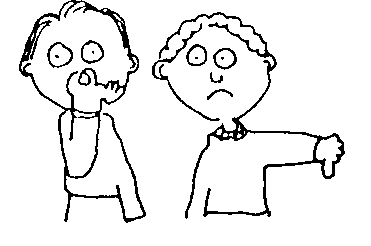

9/02/01
Note
to teachers: I
thought long and hard about putting up this link.  As a former teacher of students with behavior disorders, my heart and soul
are those of a teacher. However, despite my many bad experiences
As a former teacher of students with behavior disorders, my heart and soul
are those of a teacher. However, despite my many bad experiences 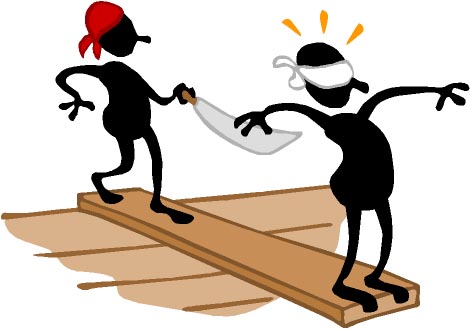 with
administrators
with
administrators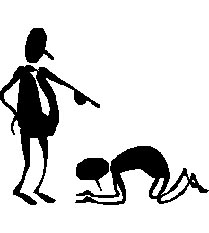 ,
I'm going over to "the dark side"
on this page in an attempt to help administrators work with their teachers
in the best interests of all involved. The only teachers who
have to fear this page are the "stage 3" discipline Nazis
,
I'm going over to "the dark side"
on this page in an attempt to help administrators work with their teachers
in the best interests of all involved. The only teachers who
have to fear this page are the "stage 3" discipline Nazis  and
those who are incompetent in managing behavior
and
those who are incompetent in managing behavior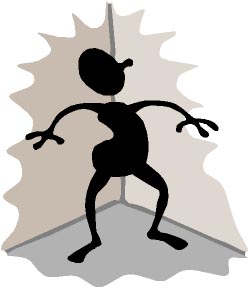 .
Actually, they'll be the biggest beneficiaries of this write up.
By helping administrators evaluate teachers' disciplinary skills, our hurtful
and ineffective colleagues can be helped to become more personable and
professional.
.
Actually, they'll be the biggest beneficiaries of this write up.
By helping administrators evaluate teachers' disciplinary skills, our hurtful
and ineffective colleagues can be helped to become more personable and
professional.
In another link on this site ("Creating your own behavior management system"), the components of a comprehensive behavior management program were described. Administrators and school based support teams can use that material and the checklist found inside another home page link ("A checklist") as part of their evaluation of a teacher's behavior management skills. On this page (below) are some further things to consider to be sure that misbehaving students are treated effectively and respectfully, while receiving the assistance they need to change for the better. This page also provides ways to ensure that mean and ineffective teachers change for the better so that they don't create the very behavior they complain about. Enlightened and effective behavior management goes beyond the basics presented in the other links mentioned above to create a system that not only controls students, but positively motivates and teaches them. That's an important point: student management should be less a matter of control than providing students with skills in self-control and positive interaction with others.
The following questions will help you to determine
if behavior management systems (classroom and school-wide)
not only create organized and efficient learning climates, but are ones
of which you can be proud to have implemented in your school building.
Assess and modify behavior management programs by considering the following:
#1 Does the system treat students
with concern and dignity?
Students who misbehave need educators who
model positive, non-coercive, non- condescending ways of dealing with issues
in their lives (e.g., handling frustration, dealing with
conflict, interacting with others). Students who feel respected,
valued, and welcomed in their academic environments are less likely to
misbehave as a rebellious response against disrespectful treatment.
Students cannot learn responsibility in an irresponsible environment.
When teachers act in ways that would be punished by the student code (e.g.,
verbal put downs, bullying, yelling, interrupting instruction, failing
to stay on task), they are essentially saying "Do
as I say, not as I do". Double standards promote resentment,
rebellion, retaliation, and disorder. When kids misbehave, notice
whether teachers express concern about the youngsters, or view them as
irritants that must be removed.
#2 Is the system known to students?
The structure of the system must be clear
to those who are governed by it. If students are to abide by the
system, they must know of it's existence and fully understand it.
This involves more than telling them about it via 1st day presentations
in classrooms and/or the distribution of pamphlets. To guarantee
awareness and comprehension, these procedures must be discussed, role-played,
and then reviewed periodically. Skits during assemblies, reminders
over announcements, posters, etc. all help to solidify the program.
It's important that the rules, regulations
and procedures should be fair and respectful, not condescending and oppressive.
Oppressed peoples strike back via "slow downs", resistance, and sabotage.
Students must feel that they are valued and that the rules are for their
benefit, learning, and safety. Teachers must be consistent in implementation
or the system exists only on paper. And why just have it on paper?
Teachers can have class web pages for use by students and parents.
You can also place the school-wide system on your web site and/or create
a videotape. When kids know the rules, procedures, and consequences,
and feel respected, they can be helped to acknowledge when they have made
an unproductive choices and need to change their behaviors to match those
shown by others in this civil place.
#3 Do educator responses to misbehavior
TEACH,
not just punish?
Like academics, behavior is taught.
Some of our students did not learn appropriate behavior at home (or
in previous grades). We know from research and decades of
observation that punishment is an ineffective method for creating behavioral
change. It doesn't teach students what they ought to be doing
(or
provide any practice in correct ways). If students don't
have the desired behaviors in their (re)action patterns
now, punishment certainly won't help them learn and incorporate them.
Punitive school discipline does have one definitive outcome: It results in lower achievement and increased aggressive behavior as resentful students respond to rejection and disrespect. Students who persistently misbehave should be TAUGHT alternative behaviors. We need to TEACH them to problem solve (see the home page link of this title) and make better decisions. Instruction can be conducted in many ways: having the youngsters demonstrate the correct behavior immediately after an incident and participate in restitution: assignment to scheduled structured group lessons in conflict resolution, social skills (see the home page link of this title), and/or anger management during recess (complete with role-playing); and so forth. Students who have been sent to time out rooms or suspended (in-school or out) should automatically be assigned to instruction that will teach them ways to better deal with the school environment.
Continued misbehavior should result in a personalized behavior
management plan developed by the school-based support team (or
other assistance team), and signed by the student, parent/guardian,
teachers of the student, and the principal. That plan should outline
POSITIVE
AND RESPECTFUL interventions to be observed by ALL
teachers with this student.
#4 Do we conduct an functional
and/or behavioral analysis when kids persistently misbehave and/or have
severe behavioral incidents?
Why would kids misbehave in an environment that
has their best interests at heart, contains positive and supportive people,
and meets their needs for comfort and respect? Few kids would
do so, so PERHAPS
(just perhaps) the educational
and personal needs of youngsters aren't being met in your building.
Behaviors are reactions to environmental conditions. It is common, perhaps typical for educators to place the blame solely on the student(s). While it is possible that the blame should be assigned to the student, we have to continually question that assumption. Environmental conditions (e.g., bullies in the hallway, mean teachers, unmeetable demands) can increase the chances of students displaying behaviors, that while disliked by educators, may be justifiable given the circumstances.
It is important to:
Require all teachers to submit a description of
their behavior management systems to administration or a school-based peer
support team. Plans should contain the four components identified
in the web site link titled "Creating your own personalized
behavior management system", and be respectful of students.
Any referral to the office should occur AFTERat
least two other interventions on the teacher's sequential intervention
list (found on the approved plan) have been attempted.
If the submissions are inadequate, require repeated submissions of system descriptions until they are precise and demonstrate "best practice" (approved by administration or the peer assistance team). Best practice can be found on this web site (and the texts and web sites recommended in the links on the home page).
Require that mean-spirited and ineffective teachers be required to implement instructional, interactional, and management practices associated with prosocial and appropriate student behavior (They can find those "best practices" for the latter two areas on this web site)
Require coercive and ineffective teachers to document that they are implementing the new and better approaches. Assistance should be provided to these not-yet-skilled educators via peer assistance teams, consults, and staff development.
Teachers who refuse to change to respectful, effective
interventions should have that fact reflected in their annual evaluations.
Teachers who are bad for kids should not have their practices condoned.
Union representatives who support the stagnation of these teachers should
be told to protect those teachers who are deserving of a defense.
Summary
Control oriented methods tend to work only
with compliant youngsters. They fail with those youngsters we most
need to reach. While punitive discipline plans often score high on
clarity and sequential factors, they fail to incorporate respect for the
students. We need to move beyond control and compliance 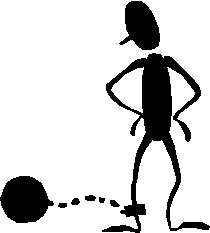 to mentoring and instilling motivation
to mentoring and instilling motivation  .
.
Heck, we're educators. That's what we're supposed to
do.
![]()
| Fetch Dr. Mac's Home Page |